The FIFA Club World Cup 2025, in its revamped format, has delivered a series of compelling narratives as it progresses towards the Round of 16. This edition features an expanded lineup, a redesigned trophy, multiple host cities, and even the introduction of referee cameras, bringing the tournament closer to the scale of the quadrennial World Cup.
Organizers have hailed the event as "a celebration of hope, excellence, and pride," uniting clubs, players, and fans through their shared passion for the sport. With numerous debutant teams and an extended month-long schedule, the competition's significance has undoubtedly grown.
The tournament showcases teams from all six confederations: 12 from Europe, 6 from South America, 4 each from Africa, Asia, and North/Central America and the Caribbean, 1 from Oceania, and 1 from the host nation.
With the group stage concluded and the field narrowed to 16, this year's Club World Cup has already witnessed its share of upsets, underdog triumphs, and intense clashes.

Auckland City, ranked 4,971st by Opta Power Rankings, entered the Club World Cup as the lowest-ranked team. They found themselves in a group with powerhouses like Bayern Munich, Benfica, and Boca Juniors. It’s important to note that Auckland City consists of amateur players competing in New Zealand's Northern League, a league of just 12 teams.
The team faced a daunting start, suffering a 0-10 defeat against Bayern Munich – the tournament's largest margin of victory – followed by a 0-6 loss to Benfica.
Facing Argentinian giants Boca Juniors in their final match, Auckland City defied expectations. Despite a staggering 4,819-point difference in rankings and Boca's rich history, the amateurs secured a 1-1 draw, denying Boca Juniors a spot in the Round of 16.
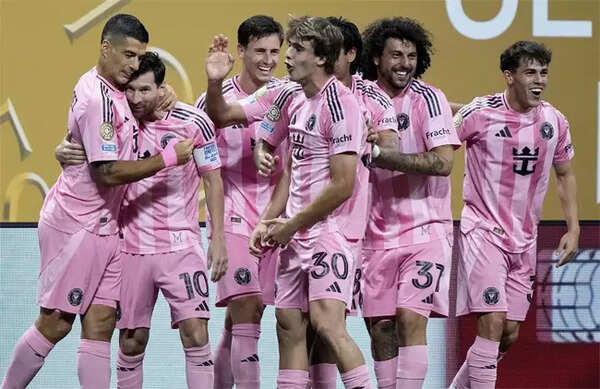
Inter Miami, featuring Lionel Messi, Luis Suarez, Jordi Alba, and Sergio Busquets, defied predictions by advancing to the Round of 16 from a group that included Porto, Al Ahly, and Palmeiras.
Despite securing only one win, it proved sufficient for qualification. After a draw against Al Ahly, Miami faced Porto. Messi's brilliance, highlighted by a stunning free kick, secured a 2-1 victory. A 2-2 draw against Palmeiras sealed Miami's place in the knockout stage.
The final matchday in Group E saw tempers flare when River Plate's Marcos Acuna and Inter Milan's Denzel Dumfries nearly came to blows after their match. The animosity, stemming from a previous encounter three years prior, involved Acuna displaying a shin guard with the 2022 World Cup trophy logo to Dumfries, referencing Argentina's victory over the Netherlands in a heated quarter-final.
Extreme heat also played a role in the tournament, with teams resorting to ice baths and cold towels for their players. Borussia Dortmund even had substitutes watch their game against Mamelodi Sundowns from the locker room to avoid the scorching conditions. Thunderstorms caused delays in multiple matches.
Adding another layer, U.S. Immigration and Customs Enforcement (ICE) and Customs and Border Protection (CBP) have a visible presence at the tournament, requiring non-citizens to provide proof of legal status to attend games.
With the 2026 FIFA World Cup, co-hosted by the United States, Mexico, and Canada, less than a year away, this Club World Cup has highlighted several potential challenges. Pitch quality and extreme weather conditions have raised concerns about the readiness for the upcoming global event.
Real Madrid's Jude Bellingham criticized the pitch conditions, stating, "The pitches aren’t great here. The pitches aren’t great at all."
Despite the emergence of underdog stories and unexpected results, the Club World Cup remains a stage for Europe's elite teams. Powerhouses like Real Madrid and Manchester City are still among the favorites to lift the trophy. However, Seattle Sounders, Urawa Reds, Ulsan, Wydad AC, and Pachuca were eliminated without earning a single point, proving that surprises can still happen.
Teams Qualified for Round of 16
Newer articles
Older articles
 Could You Have Prediabetes? 5 Warning Signs to Watch For
Could You Have Prediabetes? 5 Warning Signs to Watch For
 New Zealand Announces Packed Home Cricket Schedule Featuring Australia, England, West Indies & South Africa
New Zealand Announces Packed Home Cricket Schedule Featuring Australia, England, West Indies & South Africa
 Rishabh Pant's "Revolutionary" Cricket Redefining the Game, Says Greg Chappell
Rishabh Pant's "Revolutionary" Cricket Redefining the Game, Says Greg Chappell
 Gavaskar Calls for Kuldeep Yadav's Inclusion in Second Test Amid Bumrah Fitness Concerns
Gavaskar Calls for Kuldeep Yadav's Inclusion in Second Test Amid Bumrah Fitness Concerns
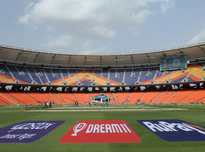 Gujarat Cricket Association to Introduce New T20 League for 2025-26 Season
Gujarat Cricket Association to Introduce New T20 League for 2025-26 Season
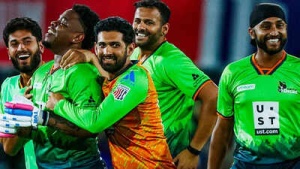 Hetmyer's Heroics: Last-Ball Six Seals Record-Breaking Chase for Seattle Orcas Against Pollard's MI New York
Hetmyer's Heroics: Last-Ball Six Seals Record-Breaking Chase for Seattle Orcas Against Pollard's MI New York
 FIFA Club World Cup 2025: Upsets, Messi Magic, and World Cup Concerns Emerge From Group Stage
FIFA Club World Cup 2025: Upsets, Messi Magic, and World Cup Concerns Emerge From Group Stage
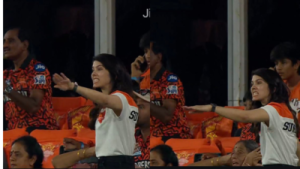 Kavya Maran on Viral Fame: SRH CEO Addresses Her Now-Famous IPL Reactions
Kavya Maran on Viral Fame: SRH CEO Addresses Her Now-Famous IPL Reactions
 SA20 Auction: Teams Allowed Six Player Retentions, Salary Cap Boosted to $2.3M
SA20 Auction: Teams Allowed Six Player Retentions, Salary Cap Boosted to $2.3M
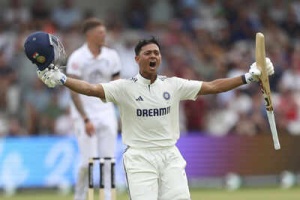 Jaiswal Aims for Historic Milestone: India Star Eyes Gavaskar's 49-Year-Old Record in Edgbaston Test
Jaiswal Aims for Historic Milestone: India Star Eyes Gavaskar's 49-Year-Old Record in Edgbaston Test